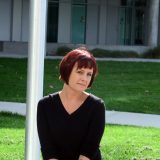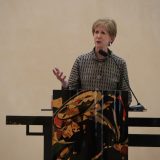From Boots to Books A Chapman student veteran's story
March 15, 2016
A story by Chapman University student veteran, Lara Mckinley
It was dark outside in my little corner of the world when the Twin Towers fell in 2001. I lived in a small community in the San Gabriel Valley. I couldn’t move away from the television; I was stuck and in shock. “What about work,” I thought to myself. My shift at the UCLA Medical Center Emergency Department, where I worked for the past eleven years as a Senior Trauma Technician, started in 50 minutes (during my days off, I studied nursing at University of Southern California and drilled twice a month as a Reservist in the US Navy as a 8404 Hospital Corpsman).
As I peeked through the front window of my car on my way to work on that day, I wondered if we would be next. Would a plane crash through one of those tall skyscrapers in our area? Would today be the last day for those people just getting to work? Today we are all the same, I thought. We were all Americans; no matter our ethnicity, sexual orientation, background, we were all affected and forever changed by this madness. My phone rang as I was driving and I knew it was a sergeant.
“Doc, did you hear what happened?” he asked.
“I did,” I said.
“You know we are gonna go get ourselves some?” the young marine replied.
“I’m gonna be right there with you Devil Dog,” I told him, not knowing what was in store for our unit.
I served in the Active Navy during the late 1980s and received an honorable discharge. I chose the Navy because my grandfather was a bugler during Pearl Harbor in WWII and served on USS Colorado. Years later I chose the Navy again but served with the Marine Corps instead because there were very few women who were 8404 Fleet Marine Force Corpsman.
I had been in the military for 14 years, drilling with various Marine Corps units but I had become especially close with this particular unit. Four months after the attacks, we began to prepare for activation. In the fall of 2002 we prepared our marines with a series of Anthrax, Yellow Fever, and Malaria shots. We squared away our medical service jackets and updated our wills. At the end of January 2003, we arrived in Iraq.
In the first month we saw over 500 patients; enemies, collation and some children. Many of the injuries were from gun shots, shrapnel fire, burns, amputations, and dehydration. Having worked in a level one trauma center I was used to the trauma and the mayhem that comes when there’s a lot of things going on.
Everyday there were sandstorms that rolled in and you couldn’t see two inches in front of you. They were loud and made the most unforgettable sounds.
After eight months, we were sent home and landed at
Camp Pendleton
. We had two hours of emotional debriefing. I was in a serious fog and so were some of my fellow sailors and marines. Our families came to meet us and everything seemed to move in slow motion. Traffic was louder, lights were brighter, and even the sound of a ticking clock felt piercing. I was diagnosed with a mild Traumatic Brain Injury as a result of an explosion. I had lost some brain function. I forgot simple things, such as, closing doors or turning off lights when leaving a room, my brain didn’t work as quickly as it used to. Today, I am plagued with frequent migraines, poorer eye site, and a spotty memory.
I didn’t talk very much the first couple of months I was home. I was angry and resentful. I started getting terrible headaches and had trouble sleeping. I felt very alone. I kept having the same reoccurring nightmares. I would wake up not knowing where I was and in cold sweats.
Mc Kinley-Lev
After being home for six months, I became pregnant with my son Daniel and it was the happiest time of my life. I felt alive again. I didn’t want to discuss anything regarding my experiences in Iraq and I had heard about Post Traumatic Stress Disorder but no one had really been talking about it. I had to keep everything together because I was going to be a mother.
Between working and raising my child, I was very overwhelmed. Suddenly, everything that was second nature became difficult to do. Every time I found myself going into a patient’s room, I started to shake and I pictured marines laying there calling my name. I was angry, frustrated, and sad at the same time. Many people would call that a moral injury.
Assimilating back into civilian life was difficult. Dealing with things like household duties, running a family, and working, while working through my mental health challenges was very hard. Veterans don’t often get the support that is needed and it’s very tough. Sometimes I think society believes that if you aren’t missing a leg or an arm, then there is nothing wrong with you.
I was working full-time while supporting my son and decided to return to the nursing program at USC. However, because a year had passed, I had to start from the beginning. Even though I had already taken a year and two months of nursing school, served in the military for 14 years, and worked as a Senior Trauma Technician at UCLA for 11 years, I had to start over. I knew I needed to complete school; I had worked so hard and planned for so many years to accomplish my goal.
Once returning to school, I realized how hard it was going to be to continue my nursing career. It was too difficult with my mental health issues. I had prepared my whole life to become a nurse but I couldn’t continue, so I turned to social work — based on the amazing experience I had in the marines and working in the ER.
I started attending Santiago Canyon College but was having difficulty taking my math tests in class because of the stress and anxiety I was feeling. One of my math professors pulled me aside one day and said, “Lara you answer all the questions in class and do very well on the homework but you are having a hard time on the tests. Have you thought about taking your tests in the Writing Center?” I told her I had PTSD and a mild TBI, and had trouble concentrating. I took her advise and after taking tests in a separate room, my grades started to improve.
During the time I went to Santiago Canyon College, we moved to Anaheim Hills. One night while studying, the wind started blowing so hard my whole house moved. I was automatically sent back to 2003, in the desert of Iraq during a sandstorm in 120 degree weather. Not only that, but every night around 9:30 p.m. fireworks go off and when I first heard them they sounded like gun fire. It took me a really long time to get used to them.
I was accepted into
Chapman University
in the fall of 2010 with the goal of completing a bachelor’s of sociology with an emphasis in social work. My military experience was life changing. The difficult and critical situations only reinforced my desire to work within my community at home.
In 2010, I took my first class at Chapman, Medical
Sociology
with
Dr. Roberta G. Lessor.
Because of my medical and military experience, especially as a combat medic, I thought the class would be easy. At the time, I don’t think I realized how difficult it would be reintegrating back into college. Our class was located in Argyros Forum during a period of major remodeling. Each time I came to class I heard banging above me which shook our whole room. It sounded like bombs going off and machine gun fire. I enjoyed the class, however I expressed my past and concerns to Dr. Lessor and was worried I would have to drop the course. Dr. Lessor emailed our class the next day telling us our classroom had been changed. I was blown away. I felt like my voice had been heard and I didn’t have to drop the class.
In 2012, I was diagnosed with breast cancer. After many rounds of chemotherapy, radiation, and six surgeries, I returned to Chapman. I am so grateful for Chapman’s flexibility, my sociology departments’ phenomenal support, and my senior thesis adviser
Dr. Lynn Horton.
My experience at Chapman is part of the reason why I am healthy. When I was home healing, I knew I would be able to come back to school once I was well. I had hope, a place to go. Chapman is like a family.
During my time at Chapman, I’ve researched the concept of female veterans and their reintegration into the home. Dr. Lynn Horton has been working with me on my senior thesis and has been invaluable on helping me focus on time management and integrating my thoughts into an Autoethnography. Her support has been vital to my integration into Chapman and finishing my degree. She also understands the effects of chemotherapy on the brain and how students who come back to college after they have had cancer need extra help.
My ultimate goal after I graduate from Chapman is to stay connected to the university. I want to keep connecting with Chapman students on the topic of veterans. I’d like to educate as many people as I can, and form a fellowship to develop a dialogue regarding veterans, especially female veterans. As veterans, we have so much to offer, especially student veterans, within our community.
Female veterans are warriors who come home, and serve in many positions, just as our male counterparts, when we assimilate back into civilian life. For centuries we have been caregivers, facilitators of the family, and the glue that holds everyone together. But, we get lost in our own battle here at home and services and help are lacking. When we have time to reflect, we look back on what has happened and wonder how we will raise our children with the moral choices we have made.






